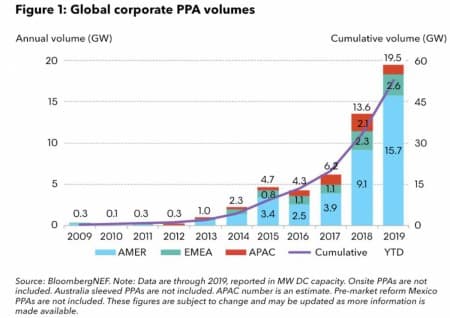Given the option, most Americans would not only prefer to choose their own utility companies but also have more of the energy that powers their homes coming from clean energy sources. That’s according to a Consumer Report survey where 81% of respondents agreed that reducing pollution from power plants is a worthwhile goal. It’s a decision that’s not entirely in their hands, though, since only 50% of Americans have the option to purchase renewable energy directly from their power suppliers though everybody has the option to purchase renewable energy certificates (RECs). Corporates’ relationship with renewable energy might not be as straightforward. For many companies, the cost of climate change, not a change of heart, could be what has been forcing them to restrategize and reduce carbon footprints or think about reducing fossil fuel consumption.
Nevertheless, corporate organizations have emerged among the biggest buyers of renewable energy.
According to a Bloomberg New Energy Finance (BNEF) report, global corporations have been striking a record number of clean energy power purchase agreements, or PPAs. In 2019, corporations purchased 19.5 gigawatts of clean power through long-term contracts, marking an impressive 40% Y/Y increase. Indeed, over the past three years, companies have quickly ramped up their clean energy purchases from 4.3GW in 2016.
When it comes to which corners of the corporate world have been buying the most renewable energy, well, there are no surprises here as Big Tech easily takes the cake.
Related: Why China Can’t Quit Coal However, the big surprise is that Big Oil, a sector that is frequently castigated for its outsized role in climate change, is beginning to make its presence felt here in a big way, too.

Source: BNEF
Big Oil to rival Big Tech
Over the past half-decade or so, tech giants Google, Amazon, Facebook, and Microsoft have been dominating clean energy procurement and are looking to continue being renewable energy’s biggest customers.
Last year, Google signed contracts to purchase over 2.7GW of clean energy globally, the biggest clean energy commitment by any company on the planet. That included contracts to buy 1.9GW of clean energy in six countries. Google employs a unique reverse auction process when signing renewable energy contracts, with developers taking part in a live, public bidding process.
Facebook had the second-largest commitments (1.1GW), while Amazon (0.9GW) and Microsoft (0.8GW) took third and fourth spots, respectively. Google has signed up to $2bn wind and solar investments with plans to use the clean energy to power its massive data centers. Meanwhile, Amazon has revealed plans to invest in four new renewable energy projects to support the company’s objective to achieve 80% renewable energy by 2024 and 100% renewable energy by 2030.
These four internet giants operate massive, power-hungry data centers that have been blamed for their copious greenhouse gas emissions. It’s, therefore, probably not surprising that they are putting some effort into ameliorating at least some of the damage.
Big Tech might be the clear leader in the renewable energy space, but Big Oil might soon rival it.
Occidental Petroleum (NYSE:OXY), Chevron (NYSE:CVX) and Energy Transfer Partners (NYSE:ET) all signed solar contracts in 2019, following in the steps of ExxonMobil (NYSE:XOM), which signed several large PPAs in 2018.
Back in November 2018, Exxon signed a PPA with Danish utility Ørsted (CPH:ORSTED) that will see the oil major buy 500 MW of wind and solar power from Ørsted’s parks in Texas for the operations of its Permian Basin oil fields.
Last year, Occidental announced the start-up of its 16-MW solar park in Texas as well as the signing of an off-take contract for an additional 109 MW of solar power.
In the same year, Chevron announced that it had signed a 12-year PPA with a wind farm in West Texas to purchase 65MW of wind energy.
Related: EIA Sees WTI Crude Averaging $44 In 2021
Meanwhile, pipeline company Energy Transfer Partners agreed to a 15-year PPA deal with Canadian Solar’s (NASDAQ: CSIQ) wholly-owned subsidiary, Recurrent Energy, LLC, for the construction of a 28 MWac Maplewood 2 Solar Project. The PPA marked Energy Transfer’s first-ever dedicated solar contract.
Robust clean energy demand
Currently, there are 270 global companies that have joined the RE100 club, i.e., companies that have committed to source 100% of their energy needs from renewable sources at some point in the future. That’s a 22% increase from last year’s tally of 221 members.
BNEF says that sustainability commitments as well as the powerful ESG megatrend will ensure that clean energy procurement from corporations continues to thrive. In fact, the energy watchdog estimates that last year’s 221 RE100 companies will need to purchase an additional 210TWh of clean electricity in 2030 to meet their targets, which in turn will catalyze an estimated 105GW of new solar and wind build globally and nearly $100B in clean energy infrastructure.

Source: BNEF
But with RE100 membership expanding at such an impressive clip, you can bet the actual clean energy and infrastructure figures are bound to be 2-3x higher than BNEF estimates.
By Alex Kimani for Oilprice.com
More Top Reads From Oilprice.com:
- The Secret Weapon That Will Save Oil & Gas Pipeline Operators Billions
- Can Big Oil Make Carbon Capture Mainstream?
- Can Colombia’s Oil Industry Stage A Comeback In 2021?


















